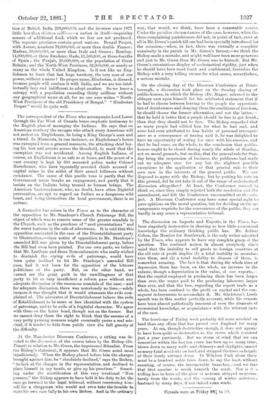On the closing day of the Diocesan Conference at Peter-
borough, a discussion took place on the Sunday closing of public-houses, iu which the Bishop (Dr. Magee) referred to the obloquy cast upon himself for his celebrated statement that if he had to choose between leaving to the people the opportuni- ties of drunkenness and denying them the conditions of freedom, he should choose the former alternative, and not the latter,— that he held it better that a people should be free to get drunk, than that they should not be free. The Bishop remarked that as many people had vilified him for what he had said, and. some had even attributed to him habits of personal intemper- ance as a consequence of having said it, he was delighted to have an opportunity of voting for once with his enemies, and that he had come, on the whole, to the conclusion that public- houses ought to be closed during nearly the whole of Sunday, not on moral grounds, but on this, that the general rule for Sun- day being the suspension of business, the publicans had made out no adequate case for any but the slightest possible exceptions to the application cf that general rule to their own case in the interests of the general public. We are disposed to agree with the Bishop ; but by putting his vote on this ground, did he not take it out of the range of ecclesiastical discussion altogether ? At least, the Conference seemed to think so, since they simply rejected both the resolution and the amendment, and left the Conference uncommitted on the sub- ject. A Diocesan Conference may have some special right to pass opinions on the moral question, but for deciding on the ar- rangements requisite for the convenience of the public, they are hardly in any sense a representative tribunal.


































 Previous page
Previous page